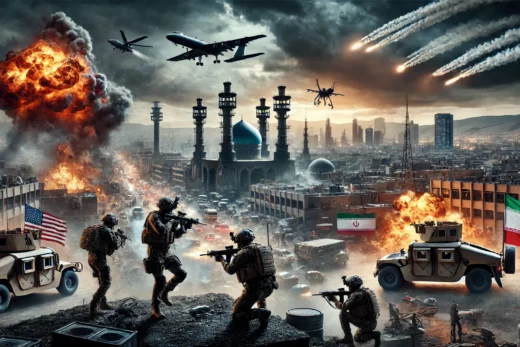Surviving The Unthinkable
![]()
If both World War 3 and a civil war broke out simultaneously in the U.S., particularly for a family living in the suburbs of Pittsburgh, PA, the scenario would be one of immense chaos and uncertainty.
Initial Shock and Confusion
-
Breaking News and Confusion: The family would first learn about the outbreak of World War 3 through the news, likely involving tensions between global superpowers escalating beyond diplomacy. Almost simultaneously, they’d hear about political or ideological factions clashing violently within the U.S., causing confusion and fear.
-
Tense Atmosphere: The family might witness divisions within their own community—neighbors they thought they knew could take sides in the civil war. Conversations at grocery stores, schools, and community centers would likely be tense, with people openly discussing taking up arms or fortifying their homes. Fear of being targeted based on political beliefs would grow.
Everyday Life and Survival
-
Supply Chain Disruption: With a global war and internal strife, supply chains would collapse quickly. Grocery stores could run out of food, fuel would become scarce, and basic resources like medicine would disappear. The family would likely stockpile whatever they could, rationing food and water.
-
Martial Law or Local Militias: The government might impose martial law in response to the civil unrest, but there could also be local militias forming in nearby areas. Pittsburgh, with its industrial history and strategic location, might see increased military presence or skirmishes between pro-government forces and rebel groups.
-
Power and Internet Outages: Global cyberattacks as part of World War 3 would likely target major infrastructure. Pittsburgh’s power grid could experience rolling blackouts, leaving the family without heat or electricity for long periods, especially in the winter months. Communication with the outside world via the internet might become impossible.
Fear of Attack and Violence
-
City Under Threat: As Pittsburgh has a significant industrial sector and military presence, the family might worry about the city being a target for bombings, missile strikes, or cyberattacks as part of the larger global conflict. The family would consider fleeing to a rural area to avoid potential airstrikes or armed groups.
-
Civil Unrest Close to Home: Nearby cities like Pittsburgh could see riots, looting, and clashes between civil war factions. Armed groups might take over local law enforcement, or there could be widespread violence. The family might barricade themselves at home or seek refuge with like-minded neighbors for safety.
Strain on Family Dynamics
-
Mental Health Struggles: The constant stress of world war, civil war, and the breakdown of society would take a toll on the family. Children might struggle with the abrupt changes to their routine, including the loss of school, friends, and normalcy. Parents would be under extreme pressure to ensure survival, leading to anxiety, depression, or conflict within the family.
-
Preparedness vs. Panic: The family might debate over how much to prepare—should they stockpile weapons, build a bunker, or try to leave? The constant threat of violence would lead to sleepless nights, and they would have to carefully watch who they trust within their community.
Economic Collapse
-
Loss of Jobs and Financial Security: With global markets in turmoil and civil unrest, jobs would likely disappear. Pittsburgh’s economy, reliant on technology, health care, and finance, would crumble. The family could lose their income and potentially face the collapse of the banking system, making any savings or financial safety nets worthless.
-
Bartering and Local Trade: Cash could become useless, leading to bartering for goods and services. The family would likely rely on any physical goods they could trade with neighbors—food, medical supplies, tools, or even skills like gardening or mechanical work.
Relocation and Refugee Status
-
Fleeing the Suburbs: If the situation worsened and either faction of the civil war gained ground, the family might face a tough decision: stay and try to defend their home or flee the area entirely. Highways would be clogged with other families trying to escape, and finding a safe place would be a gamble.
-
Becoming Refugees: If the civil war escalated, parts of the U.S. could fragment, and international organizations might get involved. The family could end up as refugees within their own country, struggling to find safety in makeshift camps or friendly territories.
Pittsburgh Residents
In a scenario where both World War 3 and a civil war break out, Pittsburgh residents would need to take specific precautions to increase their chances of survival. Here’s a list of ways to prepare, tailored to residents of Pittsburgh:
1. Stockpile Essential Supplies
- Food and Water: Store at least three months of non-perishable food (canned goods, dried beans, rice, etc.) and bottled water. Pittsburgh winters are harsh, so focus on food that can be easily stored and prepared without electricity.
- Water Purification: Since water supplies might become contaminated or scarce, invest in water filtration systems or purification tablets for access to clean water.
- Fuel: Gas stations will quickly run out of fuel. Store enough gasoline for your car, generators, and portable stoves. Make sure to follow safety guidelines for fuel storage.
2. Prepare for Power Outages
- Generators: Given the potential for power grid failures, a reliable generator can keep your household warm during Pittsburgh’s cold months. Stockpile fuel for the generator.
- Solar Power: Invest in solar chargers for essential electronics (phones, flashlights, etc.). Solar-powered battery packs can be useful if you lose access to electricity.
- Thermal Blankets: Have enough thermal blankets or sleeping bags to keep everyone warm if heating systems fail, especially during winter.
3. Home Defense and Security
- Fortify Your Home: Reinforce doors and windows to protect against potential looters or civil unrest. Consider installing security cameras and motion-sensor lights.
- Weapons for Self-Defense: While not everyone is comfortable with firearms, in such a scenario, it’s wise to consider owning a weapon for self-defense (in compliance with local laws). Stock up on ammunition.
- Community Defense: Coordinate with trusted neighbors for mutual protection. A community response to potential threats is often more effective than individual efforts.
4. Develop an Evacuation Plan
- Escape Routes: Familiarize yourself with multiple evacuation routes out of Pittsburgh. Main highways may become blocked, so have alternative rural or less-traveled roads mapped out.
- Go-Bags: Prepare "bug-out bags" for each family member. These should include essential documents, cash, medications, food, water, clothing, and personal hygiene items.
- Relocation Options: Identify safe places outside the city, whether with family, friends, or rural areas where conflict may not reach. Be prepared to leave your home if necessary.
5. Build Local Networks
- Neighborhood Groups: Start networking with your community now. Develop plans for sharing resources, organizing defense, or helping vulnerable neighbors. A strong community is invaluable in crises.
- Local Resources: Research local emergency services and charities that may assist in the early stages of the crisis. Knowing who to contact for help or supplies is key.
6. Alternative Communication Methods
- Walkie-Talkies or CB Radios: Cell towers and internet infrastructure may fail. Invest in two-way radios to stay in touch with family members or neighbors. CB radios can also provide information on local conditions.
- Ham Radio: Consider getting a ham radio and learning how to use it. In the event of a communications blackout, ham radio operators are often the only source of reliable information.
7. Medical Supplies and First Aid
- First Aid Kits: Stock up on first aid supplies, including bandages, antiseptics, pain relievers, and antibiotics. Consider taking a basic first aid course to learn how to treat common injuries.
- Medications: If anyone in the family relies on prescription medications, try to obtain extra supplies and store them safely. Consider alternative remedies for minor illnesses or injuries.
8. Prepare for Cold Weather Survival
- Heat Sources: Pittsburgh winters are brutal, and with power outages, staying warm becomes critical. Stockpile firewood if you have a wood-burning stove or fireplace. Propane heaters and warm clothing are also vital.
- Winter Clothing: Ensure every family member has enough cold-weather gear—thermal clothing, insulated boots, hats, gloves, and coats. Exposure to the cold can be deadly if heating fails.
9. Financial Preparedness
- Cash: In a crisis, ATMs and banks may close, rendering credit cards useless. Keep a reserve of cash in small denominations for essential purchases or bartering.
- Precious Metals: Some people also invest in gold or silver coins as a backup currency in case the financial system collapses. These can be useful for trading in extreme circumstances.
10. Self-Sufficiency and Skills Development
- Gardening: Consider starting a small garden for growing your own vegetables and herbs. Pittsburgh’s short growing season means you’ll want to learn about cold-weather gardening techniques or greenhouses.
- Basic Mechanical Skills: Learn how to maintain vehicles and fix basic machinery, as access to professionals may be limited. Knowing how to repair a car or generator can be critical.
- Basic Survival Skills: Learn skills like fire-starting, water purification, and shelter-building, especially if you have to leave your home. These skills can be the difference between life and death in the wilderness.
11. Stay Informed
- Emergency Alerts: Sign up for emergency notifications from local and federal authorities. These alerts could provide crucial updates on safety, evacuation orders, or local aid.
- Alternative News Sources: With global war and civil unrest, media outlets might be disrupted. Learn to use shortwave or ham radios to receive news and updates, both locally and internationally.
By preparing in these ways, a family living in Pittsburgh can increase their chances of staying safe, secure, and resilient in the face of both global and national turmoil. Preparing now, before any crisis unfolds, is essential to avoid being caught off guard in a worst-case scenario.
Final Reflections
In this scenario, a suburban family in Pittsburgh would face incredible hardship, fear, and instability. The dual threat of global conflict and internal civil war would make survival a day-to-day struggle. What was once a peaceful neighborhood would become an unpredictable battleground where trust is scarce, supplies are limited, and hope for the future becomes increasingly uncertain.



